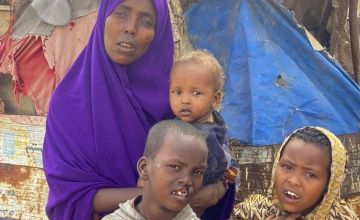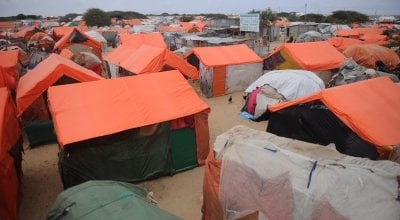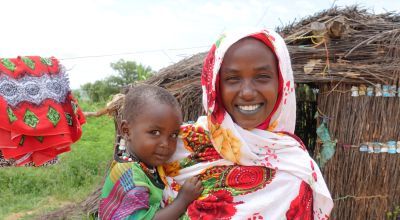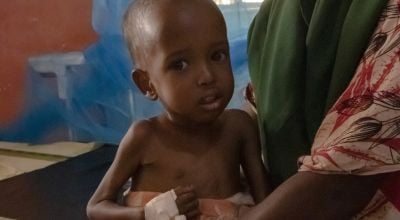
Read our 2024 annual report

Knowledge Hub
A fifth failed rainy season across the region means that there are parts of Somalia, Kenya and Ethiopia that have not had rain since 2019. More than 28 million people are at risk of starvation, including 5 million children. Harvests are failing due to the lack of rain, leaving families unable to grow food for themselves or to sell at market. Unfortunately, the rocketing prices of staples like wheat and sorghum, plus the rising cost of fuel, mean that families can also struggle to buy food.
The situation is even more troubling for expectant mothers. When a mother is undernourished during pregnancy, her own nutritional health isn’t the only health at stake. Any complications brought on by low nutrition during pregnancy, such as anaemia, hypertension, miscarriages, premature delivery, or maternal death, will have an effect on her child as well.
Many children born to mothers who are undernourished will likely grow up stunted (when a child has a low height for their age) or malnourished themselves. Add in the pressure of pregnant mums struggling to feed their other children, and the situation can become even worse.
Farhiya's story

Farhiya Barre is a 38-year-old woman living in Yirowe, a village around 18km from Burao town, in Somaliland. She has five children, three boys and two girls, with three of the five under five years of age.
Living with a disability after suffering a hand burn as a child, Farhiya and her children depend on her husband as the main breadwinner of the house. However, he is a daily labourer, and due to the unpredictability of availability of daily work, he can often go weeks without a job.
When Farhiya was introduced to Concern Worldwide, she was pregnant with her fifth child, and was worried about how she would afford milk for her baby when they were born. She and her husband were also struggling to pay the bills, and often sat in a dark house as they couldn’t afford electricity.
This is when Farhiya heard about the cash-based social transfer model of the Social Transfers project, implemented by Somaliland’s Ministry of Employment, Social and Family Affairs (MESAF) in coordination with Concern Worldwide, through the Somali Cash Consortium (SCC). She was also referred to the Maternal and Child Health (MCH) centre as part of the social protection scheme funded by the Royal Danish Embassy, to receive care during her pregnancy.
Maternal care and nutrition support
After Concern and the staff at the MCH verified Farhiya’s eligibility, she was enrolled in the programme to receive antenatal and postnatal care. With her first four children, Farhiya gave birth at home, which can be extremely dangerous for both the mother and the baby if complications occur during the birth. In fact, Somalia has one of the highest maternal mortality rates in the world, with approximately 829 deaths per 100,000 births. However, after registering with the MCH, Farhiya was able to have her fifth baby in the centre, and was given the medical support she needed. She also receives important health messaging regarding nutrition and the benefits of breastfeeding her baby.
Farhiya is happy that she has this support.
I am pleased to be one of the beneficiaries of this social transfer programme. It encouraged me to visit the MCH regularly for its antenatal and postnatal care and nutrition services, and whenever my baby gets sick.
She explains, “My last child was delivered at the MCH, but all of my previous children were born at home because I wasn’t aware of the benefits of being a regular patient at a MCH before and after the pregnancy. Now I even receive audio messages from the government through my mobile phone on the benefits of breastfeeding and correct nutrition to ensure the health of the baby.
The power of cash transfers
After delivering a healthy baby, Farhiya’s concerns then turned to how she would pay for necessary items for her newest arrival, as well as her other children. This is where cash transfers came into play.
The SCC’s Social Transfers programme aims to protect and promote socio-economic opportunities for vulnerable Somalilanders through the provision of cash-based social transfers in the Somaliland Corridor. The programme’s objective is to promote improved resilience and the reduction of poor and marginalised households and communities in Somaliland. Around 1,275 pregnant and lactating women have been targeted by the programme in Hargeisa and Burao, with many of the beneficiaries living in IDP (internally displaced persons) camps.
Farhiya received her first cash transfer in October 2022, and will continue to receive payments for 14 months. With this cash, she was able to buy a torch and batteries for her household. She explained: “I used to live in a dark house because I couldn't afford to pay the electricity bills. I have a torch for light at night but I couldn't get money to buy batteries. Now when I receive the $20 (€18.40), I bought batteries.”

The cash transfers combined with the maternal health support she has received have also eased Farhiya’s worries about feeding her newborn baby. She has also been able to save some money to invest in other essential items for her baby. Thanking the donors, government and Concern for their assistance, she said: “I saved some of the money I received, and I could rent a Bajaj (a three-wheeled vehicle used for transport in Somaliland) to Burao town to buy items I need for my baby that are not available in my village.”
Cash transfer programmes empower beneficiaries to make important decisions about meeting their immediate needs and investing in longer-term livelihoods options, so families like Farhiya’s can look forward to a more stable future.
Follow us on Instagram for updates





